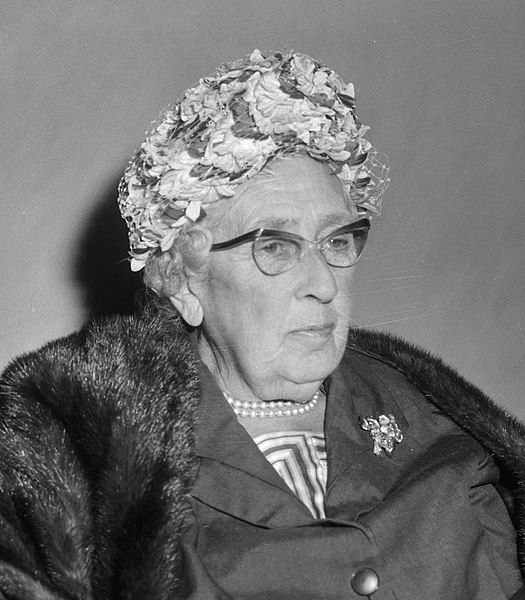
Christie, Agatha
It has been estimated that Agatha Christie’s books and other publications have sold over two billion copies, and they have been translated into over 40 foreign languages. Only the works of Shakespeare and the Holy Bible have sold more. To anyone unfamiliar with Christie’s work, this enormous achievement – by a writer best known for her entertaining, unthreatening detective fiction – might appear puzzling. However, despite her obvious similarity to other writers of ‘cosy’ mid-twentieth-century Golden Age detective fiction such as Dorothy Sayers and Margery Allingham, Christie’s superlative handling of the genre makes her the pre-eminent writer in this field.Agatha Christie was born Agatha Miller in 1890, into a prosperous middle-class family. Unhindered by any formal education until a spell at a boarding school in Paris at the age of 16, she enjoyed writing stories and poems, and before she was 20 she had several poems published in magazines. Her first novel was the detective story, The Mysterious Affair at Styles, was written during the 1914–18 war (when Christie worked as a Red Cross hospital nurse and dispenser) but was not published until 1920. The story was the first of over 40 to feature her eccentric but brilliant Belgian detective, Hercule Poirot. Her first big success (in terms of both earnings and popularity) was The Murder of Roger Ackroyd, published in 1926. In 2013 this work was chosen by the British Crime Writers’ Association as ‘the best crime novel ever written’. However, its ingenious plotting has been at least equalled – if not surpassed – on many subsequent occasions by Christie, including her island-set masterpiece, And Then There were None (1939).
In 1914 she married Archie Christie – a pilot in the Royal Flying Corps. Rosalind, her only child, was born in 1919. The marriage ended in divorce in 1928, and in 1930 Christie married Max Mallowan, an archaeologist. This marriage – and the associated travelling in the Middle East that it entailed – ushered in a very productive period for Christie, influencing works including Murder on the Orient Express (1934), Murder in Mesopotamia (1936), Death on the Nile (1937), and Appointment with Death (1938).
Agatha Christie continued to entertain her multitude of admirers in the following decades. The first book featuring her elderly female detective, the shrewd and observant Miss Jane Marple – The Murder at the Vicarage – was published in 1930, but further Miss Marple books appeared until well into the 1970s – as did Poirot’s masterful investigations.
By the time of her death, Agatha Christie was an enormously popular writer and had written over 100 works; these included 66 detective novels, and collections of short stories, poetry and plays. One of the latter, The Mousetrap, opened in London in 1952 and ran longer than any play ever performed on stage – closing only in 2020 due to the pandemic. Her work has been adapted into many feature films and other media. Writing as ‘Mary Westmacott’, she also published six acclaimed novels which explore characters, families and relationships. In 1971 she was appointed Dame Commander of the British Empire in the New Year’s honours list, in recognition of her literary achievements.
The final Hercule Poirot novel concluded with the detective’s fictional death in Curtain: Poirot’s Last Case (1975). Fittingly, this was also the last book by Agatha Christie published in her lifetime. She died on 12th January 1976, aged 85, and is buried in the graveyard of St Mary’s Church in Cholsey, Oxfordshire, near the house where she spent her last years.
© ZigZag Education 2026: content may be used by students for educational use if this page is referenced.
Show / hide details
| 1890 |
Born
|
|
| 1905–1907 |
Education
|
|
| 1914 |
Married Archibald (Archie) Christie
|
|
| 1914–1918 |
War service
|
|
| 1919 |
Daughter, Rosalind, born
|
|
| 1920 |
The Mysterious Affair at Styles published
|
|
| 1926 |
The Murder of Roger Ackroyd published
|
|
| 1928 |
Divorce of Agatha and Archie Christie
|
|
| 1930 |
Married Max Mallowan
|
|
| 1930 |
The Murder at the Vicarage published
|
|
| 1930 |
Giant’s Bread published
|
|
| 1934 |
Murder on the Orient Express published
|
|
| 1939 |
And Then There Were None published
|
|
| 1939–1945 |
War service
|
|
| 1952 |
Christie’s stage play The Mousetrap opened in London
|
|
| 1971 |
Christie appointed Dame Commander of the British Empire
|
|
| 1974 |
Film premiere of Murder on the Orient Express
|
|
| 1975 |
Curtain: Poirot’s Last Case published
|
|
| 1976 |
Death
|
Acknowledgements
Photo credit: Agatha_Christie_in_Nederland courtesy of Joop van Bilsen for Anefo, Creative Commons Licence CC0 1.0 Universal

